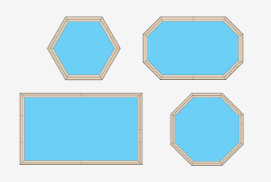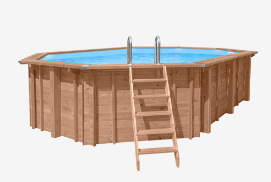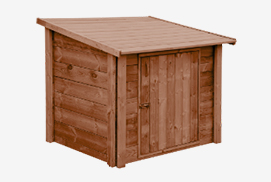Did you know that during the first 20 years of growth, trees in a single hectare can absorb between 4.5 and 40.7 tons of carbon dioxide per year? This remarkable range highlights the potent environmental impact of wood, a material celebrated not just for its enduring beauty but also for its substantial environmental benefits. Wooden swimming pools, as an extension of this material’s use, offer a green alternative in the leisure and swimming pool industry that is both sustainable and beneficial to our planet1.

Wood is a Renewable Resource
Wood stands out in the realm of building materials for its ability to be replenished naturally. Forests can be regrown through cyclical planting and harvesting practices. This continuous cycle not only ensures a steady supply of wood but also contributes to the health of our ecosystems. By choosing wooden products, consumers engage in supporting renewable resources, aligning their leisure choices with environmental sustainability.
The Carbon Footprint of Wood
As trees grow, they absorb carbon dioxide from the atmosphere, a principal greenhouse gas. This carbon remains trapped within the wood, even after it is crafted into products like swimming pools. In this way, wooden pools serve not just as a recreational feature but as a carbon storehouse, mitigating the impact of climate change. Compared to materials like plastic and metal, wood has a significantly lower carbon footprint throughout its lifecycle.
Energy-Efficiency in Wood Processing
The process of transforming wood from raw logs to finished products consumes less energy than the manufacturing of many other materials. This reduced energy requirement translates to lower greenhouse gas emissions, reinforcing wood’s role as an environmentally preferable choice. Wooden pools, by virtue of their material, embody this principle of energy efficiency.
Wood’s Durability and Longevity
Properly maintained wood can last for decades, if not centuries. This longevity reduces the need for frequent replacements and, consequently, the environmental impact associated with the production of new materials. Wooden pools are designed to stand the test of time, providing lasting value and minimizing their environmental footprint over their lifecycle.
Wood Supports Biodiversity
Sustainable forestry practices not only provide us with valuable wood but also help maintain diverse ecosystems. These forests are vital habitats for countless species of flora and fauna, playing a critical role in preserving biodiversity. By supporting industries that rely on sustainably sourced wood, like wooden pools, consumers contribute to the conservation of these vital natural habitats.
Wood Promotes a Circular Economy
Even at the end of its life, wood does not have to go to waste. Wood scraps and old wooden products can be repurposed or recycled into new items, contributing to a circular economy that emphasizes maximum resource utilization and minimal waste. Wooden pools, when no longer usable, can be dismantled and the wood repurposed, reflecting a commitment to resource efficiency.
Wood’s Impact on Air Quality
Indoor air quality is significantly improved in environments containing wood because it does not off-gas harmful volatile organic compounds (VOCs). Moreover, wood helps to regulate humidity, enhancing comfort and health. Outdoors, the role of trees and forests in improving air quality by filtering pollutants underscores the broader environmental benefits of wood-based products.
Wood is a Natural Insulator
The insulating properties of wood contribute to natural energy savings. Wooden pools, by virtue of their material, can help maintain water temperatures more efficiently than pools made of less insulative materials, reducing the energy required for heating. This natural insulation extends to the broader use of wood in building applications, where it reduces the reliance on artificial heating and cooling systems.
Wood’s Contribution to Water Protection
Forests are natural water purifiers, with trees acting as filters that trap pollutants and sediments. This capability extends to the role of wooden structures in managing water.
Wrapping Up
Choosing a wooden pool is not just a lifestyle or aesthetic choice — it’s a commitment to sustainability and ecological responsibility. The very nature of wood, from its growth to its processing and eventual reuse, represents a cycle of life that supports our planet’s health and resources. As we seek ways to enjoy our leisure time, let us consider how our choices can also protect and preserve the environment for future generations. Wooden pools offer a path to just that—a swim towards a more sustainable world.
Resources
How much CO2 Does a Tree Absorb?
The Advantages of Wood as a Building Material
Top 10 Reasons Why Wood is Eco Friendly













